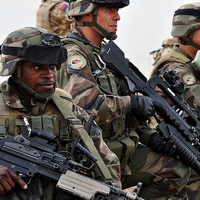Over the weekend, the Washington Post published a report that noted strong divisions between British and American military advisers over how best to prosecute the coalition's counterinsurgency campaign in the northern part of Afghanistan's Helmand province. The dispute highlights continuing disagreements on Afghan War strategy even among the closest NATO allies.
Helmand province is the heartland of the Taliban insurgency (.pdf) in southern Afghanistan. Bordering Pakistan, where the Taliban has its base of operations, it has a population of over 1.4 million extremely poor Pashtuns, most of whom live in small towns and villages along the Helmand River. The economy is largely agricultural and produces half of Afghanistan's opium, making it a haven for various insurgent and criminal groups. Until 2005, there had been no significant Afghan government or coalition presence in the province. Not surprisingly, Helmand was heavily infiltrated by the Taliban, who terrorized locals into supporting them instead of the barely functioning local government.
As a collective entity, NATO had no experience preparing for or waging a counterinsurgency campaign before 2003, when the alliance took charge of the International Security Assistance Force (ISAF) in Afghanistan. The previous NATO campaigns in Bosnia-Herzegovina and Kosovo were initially conducted as conventional military operations. They subsequently transitioned into peacekeeping missions dedicated to establishing a benign security environment in which other institutions could assume the lead role in promoting political and economic reconstruction. Nevertheless, despite having now fought in Afghanistan for almost a decade, NATO governments have yet to agree on a joint counterinsurgency doctrine.

